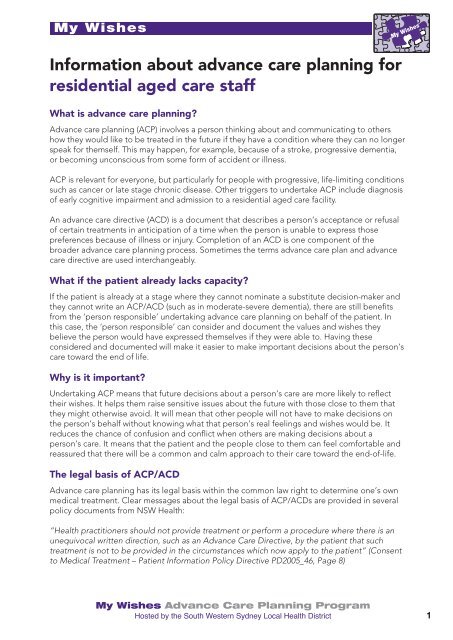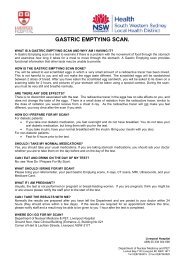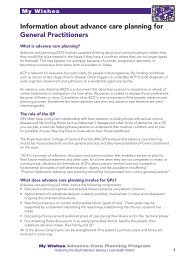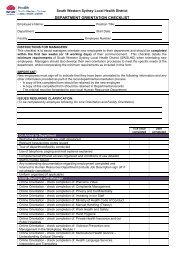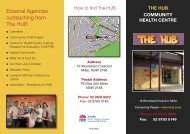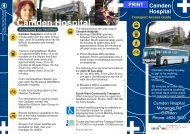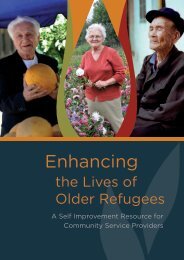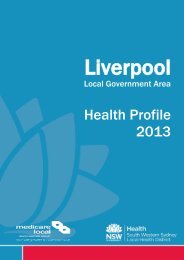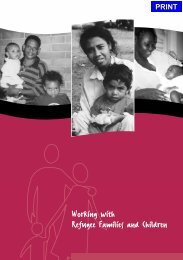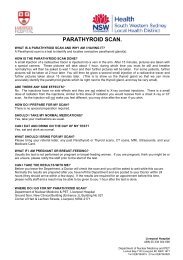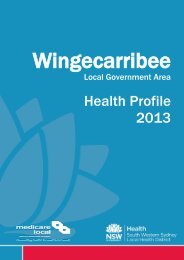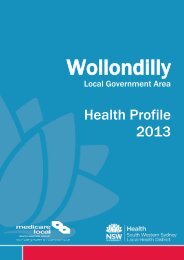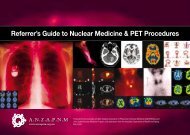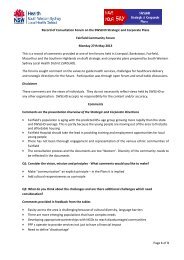Information for residential aged care staff - South Western Sydney ...
Information for residential aged care staff - South Western Sydney ...
Information for residential aged care staff - South Western Sydney ...
You also want an ePaper? Increase the reach of your titles
YUMPU automatically turns print PDFs into web optimized ePapers that Google loves.
My Wishes<br />
<strong>In<strong>for</strong>mation</strong> about advance <strong>care</strong> planning <strong>for</strong><br />
<strong>residential</strong> <strong>aged</strong> <strong>care</strong> <strong>staff</strong><br />
What is advance <strong>care</strong> planning?<br />
Advance <strong>care</strong> planning (ACP) involves a person thinking about and communicating to others<br />
how they would like to be treated in the future if they have a condition where they can no longer<br />
speak <strong>for</strong> themself. This may happen, <strong>for</strong> example, because of a stroke, progressive dementia,<br />
or becoming unconscious from some <strong>for</strong>m of accident or illness.<br />
ACP is relevant <strong>for</strong> everyone, but particularly <strong>for</strong> people with progressive, life-limiting conditions<br />
such as cancer or late stage chronic disease. Other triggers to undertake ACP include diagnosis<br />
of early cognitive impairment and admission to a <strong>residential</strong> <strong>aged</strong> <strong>care</strong> facility.<br />
An advance <strong>care</strong> directive (ACD) is a document that describes a person’s acceptance or refusal<br />
of certain treatments in anticipation of a time when the person is unable to express those<br />
preferences because of illness or injury. Completion of an ACD is one component of the<br />
broader advance <strong>care</strong> planning process. Sometimes the terms advance <strong>care</strong> plan and advance<br />
<strong>care</strong> directive are used interchangeably.<br />
What if the patient already lacks capacity?<br />
If the patient is already at a stage where they cannot nominate a substitute decision-maker and<br />
they cannot write an ACP/ACD (such as in moderate-severe dementia), there are still benefits<br />
from the ‘person responsible’ undertaking advance <strong>care</strong> planning on behalf of the patient. In<br />
this case, the ‘person responsible’ can consider and document the values and wishes they<br />
believe the person would have expressed themselves if they were able to. Having these<br />
considered and documented will make it easier to make important decisions about the person’s<br />
<strong>care</strong> toward the end of life.<br />
Why is it important?<br />
Undertaking ACP means that future decisions about a person’s <strong>care</strong> are more likely to reflect<br />
their wishes. It helps them raise sensitive issues about the future with those close to them that<br />
they might otherwise avoid. It will mean that other people will not have to make decisions on<br />
the person’s behalf without knowing what that person’s real feelings and wishes would be. It<br />
reduces the chance of confusion and conflict when others are making decisions about a<br />
person’s <strong>care</strong>. It means that the patient and the people close to them can feel com<strong>for</strong>table and<br />
reassured that there will be a common and calm approach to their <strong>care</strong> toward the end-of-life.<br />
The legal basis of ACP/ACD<br />
Advance <strong>care</strong> planning has its legal basis within the common law right to determine one’s own<br />
medical treatment. Clear messages about the legal basis of ACP/ACDs are provided in several<br />
policy documents from NSW Health:<br />
“Health practitioners should not provide treatment or per<strong>for</strong>m a procedure where there is an<br />
unequivocal written direction, such as an Advance Care Directive, by the patient that such<br />
treatment is not to be provided in the circumstances which now apply to the patient” (Consent<br />
to Medical Treatment – Patient <strong>In<strong>for</strong>mation</strong> Policy Directive PD2005_46, Page 8)<br />
My Wishes Advance Care Planning Program<br />
Hosted by the <strong>South</strong> <strong>Western</strong> <strong>Sydney</strong> Local Health District<br />
1
My Wishes<br />
“An advance <strong>care</strong> directive that complies with the requirements set out in this document is legally<br />
binding in NSW, and functions as an extension of the common law right to determine one’s own<br />
medical treatment. A failure to comply with such an advance <strong>care</strong> directive refusing a particular<br />
treatment may result in the health professional incurring criminal or civil liability <strong>for</strong> providing that<br />
treatment.” (Using Advance Care Directives – NSW, Page 5)<br />
The requirements referred to in the last quote are document standards that should be met be<strong>for</strong>e an<br />
ACD is considered to have sufficient authority to act on are outlined below.<br />
• Specificity: the ACD should be clear and specific enough to guide clinical <strong>care</strong> in the circumstances<br />
under consideration<br />
• Currency: while an ACD prepared some time ago may not reflect the current intentions of the<br />
patient, it should still be accepted as valid. People should be encour<strong>aged</strong> to update their ACD<br />
periodically<br />
• Competence: the person must have been competent to make their own health <strong>care</strong> decisions when<br />
the ACD was made<br />
• Witnessing: while this is not essential, it is encour<strong>aged</strong> to allow follow-up if necessary and to allay<br />
fears of <strong>for</strong>gery or the ACD being written under pressure from another person.<br />
What does ACP involve <strong>for</strong> <strong>residential</strong> <strong>care</strong> <strong>staff</strong>?<br />
• Identify whether a resident has capacity to make their own <strong>care</strong> decisions or whether these have to<br />
be made by a substitute decision maker (called the ‘person responsible’ in NSW).<br />
• If the resident still has capacity, help them identify who their substitute decision maker would be and<br />
whether they need to <strong>for</strong>mally appoint someone in this role as an Enduring Guardian.<br />
• Support the resident or their person responsible to discuss their current health problems and likely<br />
treatment choices into the future with their GP and Specialist doctors.<br />
• For a resident with capacity, encourage them to explore and discuss their values and wishes about<br />
their end-of-life <strong>care</strong> with people who will be their substitute decision makers if the need arises.<br />
• If the resident does not have capacity, encourage the person responsible to consider what the<br />
resident’s values and wishes would be related to their end-of-life <strong>care</strong>.<br />
• Organise documentation related to ACP discussions and ensure this is maintained in a prominent<br />
way in the person’s medical records.<br />
• Ensure that ACP documentation is referred to and used in any <strong>care</strong> planning and treatment<br />
decisions <strong>for</strong> the person in the future.<br />
• Ensure that ACP documentation accompanies any residents who need to be transferred to hospital.<br />
Which <strong>staff</strong> are responsible <strong>for</strong> ACP?<br />
ACP has not been developed as the role of one particular group of health<strong>care</strong> <strong>staff</strong>. There are several<br />
levels of responsibility.<br />
All <strong>staff</strong> with a direct caring role <strong>for</strong> patients and resident-related administrative <strong>staff</strong> should:<br />
understand what ACP is; be able to explain ACP to patients in general terms; be able to locate and<br />
provide in<strong>for</strong>mation about ACP to residents and family; and be able to recognise and manage ACP<br />
<strong>for</strong>ms within the resident records system.<br />
More senior <strong>care</strong> <strong>staff</strong> and GPs should be able to do all the above, as well as: initiate and facilitate<br />
discussions with a resident and/or their substitute decision makers; fully document outcomes of ACP<br />
discussions in the relevant <strong>for</strong>mat <strong>for</strong> their own facility; take responsibility <strong>for</strong> knowing if a resident has<br />
an ACP; and ensuring any ACP is referred to and used in any subsequent <strong>care</strong> planning.<br />
My Wishes Advance Care Planning Program<br />
Hosted by the <strong>South</strong> <strong>Western</strong> <strong>Sydney</strong> Local Health District<br />
2
My Wishes<br />
It is important to emphasise that ACP needs to be approached in a systematic way across the<br />
organisation – rather than being seen as the responsibility of one or more groups of <strong>staff</strong>. This means<br />
there should be a clear commitment to ACP from senior management; ACP roles built into routine<br />
resident <strong>care</strong> systems; readily available in<strong>for</strong>mation, <strong>for</strong>ms and other resources; and comprehensive<br />
education <strong>for</strong> all relevant <strong>staff</strong>..<br />
Using ACP documents in end-of-life decision-making<br />
Medical decision-making at the end-of-life can be a complicated and difficult process. It is not always<br />
clear how treatable or reversible a certain condition is. If an ACP/ACD does exist, it may not be specific<br />
or clear enough to guide decisions about <strong>care</strong>. It may be difficult to access substitute decision-makers<br />
or they may be unsure about what treatments they want their loved one to have. The process of<br />
decision-making is also influenced by the experience and seniority of the treating medical officer and<br />
other <strong>staff</strong>, and whether there are clear policies and protocols in place.<br />
In the context of these difficulties, it would be naive to suggest that an ACP/ACD will always be<br />
automatically followed by a medical officer having to make end-of-life medical decisions, especially<br />
in an emergency situation.<br />
However, medical officers and other <strong>staff</strong> involved in end-of-life medical decisions must:<br />
• make every ef<strong>for</strong>t to ascertain if there are any ACP/ACD documents in existence by checking the<br />
medical records and asking the patient or their family<br />
• make every ef<strong>for</strong>t to clarify the reversibility of the current problems and the patient’s prognosis as<br />
accurately as possible<br />
• <strong>care</strong>fully consider the currency, specificity and relevance of any ACP/ACD documents in terms of the<br />
current clinical situation<br />
• refer to any ACP/ACD documents in discussions with substitute decision-makers about treatment<br />
decisions<br />
• make medical decisions and recommendations that reflect the wishes of the patient as stated in an<br />
ACP/ACD that they consider to be current, specific and relevant to the current situation<br />
• seek guidance from more senior <strong>staff</strong> if they are unclear about how to incorporate ACP into their<br />
end-of-life decision making<br />
• document these considerations and the decision-making process fully in the patient’s medical<br />
record, including reasons why an ACP/ACD may not have been followed.<br />
What <strong>for</strong>mats are available <strong>for</strong> ACP?<br />
There is no single or mandated <strong>for</strong>m or <strong>for</strong>mat <strong>for</strong> ACP. There are several programs that are referenced<br />
below that facilities may want to investigate. Facilities can either adopt an existing <strong>for</strong>m or else<br />
incorporate ACP in to their existing <strong>for</strong>ms and processes.<br />
While it is important that patients and their ‘persons responsible’ are free to choose any <strong>for</strong>mat of ACP,<br />
the My Wishes program was developed by the <strong>Sydney</strong> <strong>South</strong> West Area Health Service as part of the<br />
medical records system and to be used across different <strong>care</strong> settings. The program consists of the<br />
following processes and associated documents:<br />
• Statement of Values and Wishes<br />
• Record of Advance Care Planning Discussions<br />
The <strong>for</strong>ms that are part of the program can be completed by the patient themselves or by their ‘person<br />
responsible’ if the patient has already lost capacity. The program also includes a series of in<strong>for</strong>mation<br />
My Wishes Advance Care Planning Program<br />
Hosted by the <strong>South</strong> <strong>Western</strong> <strong>Sydney</strong> Local Health District<br />
3
My Wishes<br />
sheets, practice guidelines <strong>for</strong> <strong>staff</strong> and educational resources, which can be found on the website<br />
listed below.<br />
Implementing ACP in the <strong>residential</strong> <strong>aged</strong> <strong>care</strong> facility<br />
There are a number of resources on the My Wishes website below that can be used by <strong>residential</strong> <strong>care</strong><br />
facilities to help them develop a more systematic approach to ACP.<br />
FURTHER INFORMATION<br />
The <strong>South</strong> <strong>Western</strong> <strong>Sydney</strong> Local Health District My Wishes Advance Care Planning Program<br />
Further in<strong>for</strong>mation about this program and copies of the ACP <strong>for</strong>ms can be obtained from<br />
www.mywishes.org.au<br />
Planning Ahead Tools website from NSW Government<br />
A comprehensive site with practical in<strong>for</strong>mation about a range of topics including Wills, Power of<br />
Attorney, Enduring Guardianship, advance <strong>care</strong> planning and elder abuse. It has a program that allows<br />
you to build your own plan. Available at: http://www.planningaheadtools.com.au<br />
start2talk<br />
A practical website <strong>for</strong> people in all parts of Australia who want to plan ahead <strong>for</strong> themselves or help<br />
somebody else plan ahead. The website has a number of worksheets that can be completed and<br />
stored online or else printed out and completed by hand. Available at: www.start2talk.org.au<br />
‘My Health, My Future, My Choice’ and ‘A Plan of Care’<br />
Two booklets that help people either plan <strong>for</strong> themselves or plan <strong>for</strong> someone who has lost capacity.<br />
While some of the in<strong>for</strong>mation is specific to New <strong>South</strong> Wales, much of it is relevant in any setting.<br />
Published by the Advance Care Directive Association. Available at:<br />
http://www.advance<strong>care</strong>directives.org.au<br />
Planning what I want<br />
An Australian website that has in<strong>for</strong>mation <strong>for</strong> the general public as well as health<strong>care</strong> professionals.<br />
It includes general in<strong>for</strong>mation on a range of ACP-related topics, examples of <strong>for</strong>ms and several video<br />
clips from experienced practitioners. Available at: http://www.planningwhatiwant.com.au<br />
Respecting patient choices<br />
A comprehensive Australian website with a range of in<strong>for</strong>mation related to ACP. Available at:<br />
http://www.respectingpatientchoices.org.au<br />
Using Advance Care Directives NSW<br />
A 13 page booklet published by NSW Health to provide advice to health professionals on the best<br />
practice use of advance <strong>care</strong> directives within an advance <strong>care</strong> planning process. Available from the<br />
web at: www.health.nsw.gov.au/policies/gl/2005/pdf/GL2005_056.pdf<br />
Guidelines <strong>for</strong> end-of-life <strong>care</strong> and decision making<br />
A 17 page booklet published by NSW Health that focuses on a process <strong>for</strong> making end-of-life decisions<br />
about <strong>care</strong>. Available from the web at:<br />
http://www.health.nsw.gov.au/policies/gl/2005/pdf/GL2005_057.pdf<br />
For further in<strong>for</strong>mation go to:<br />
www.mywishes.org.au<br />
My Wishes Advance Care Planning Program<br />
Hosted by the <strong>South</strong> <strong>Western</strong> <strong>Sydney</strong> Local Health District<br />
4


